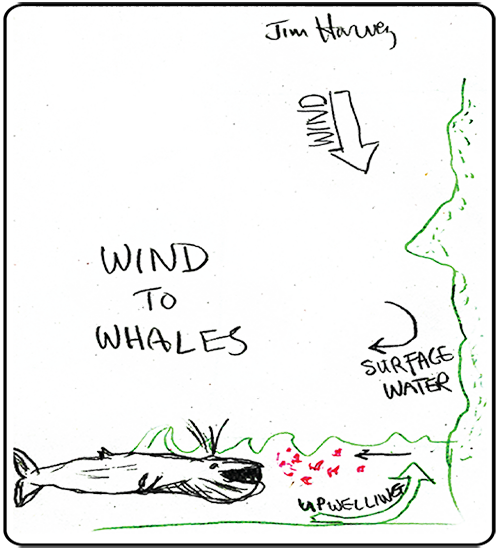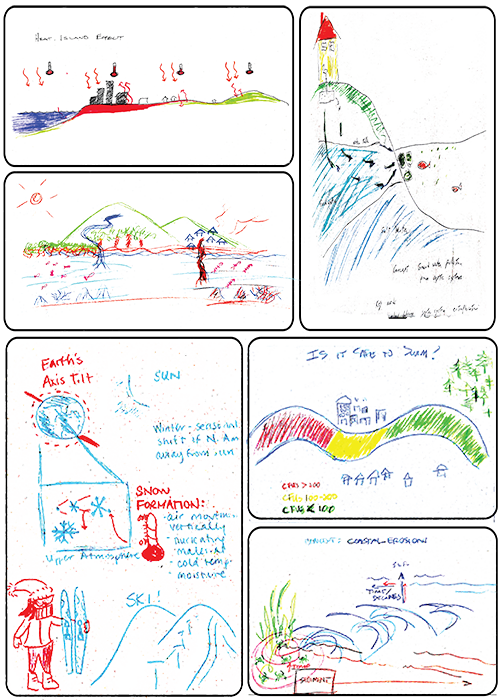Communicating science with marine laboratory and field station directors at the Marine Biological Laboratory, Woods Hole, MA
Bill Dennison · | Science Communication | 1 commentsI was asked by Mike DeLuca from Rutgers University to present a plenary talk at the annual gathering of the National Association of Marine Laboratories (NAML), which was held jointly with the Organization of Biological Field Stations (OBFS) at the Marine Biological Laboratory in Woods Hole, MA. The meeting was titled 'Windows to the World: Networking field stations and marine labs to address environmental change'.

I welcomed the opportunity to return in September 2014 to the site of my PhD research, finished almost exactly thirty years ago in 1984. As part of my talk, I chronicled my science communication journey from hand drawn black and white diagrams to computer generated color diagrams, the creation of a symbol library and the development of the
I conducted some interactive exercises with my audience of marine lab and field station directors. The first exercise was for each person to generate a statement using the ". . . AND . . . BUT . . . THEREFORE . . ." statement rubric developed by Randy Olson. Mike DeLuca and Nancy Rabalais scanned the ABT cards and selected three for the audience to vote on and the winner was the tongue in cheek observation about the Lillie Auditorium where the meeting took place:
"This auditorium is air conditioned for comfort during summer AND there are many people in this auditorium BUT this auditorium is too cold now THEREFORE we should have the thermostat increased for comfort and energy conservation."
There were several ABT statements that effectively summarized various scientific observations:
"Students videotape moray eel eating a lionfish AND observation is reported as a control measure BUT lionfish outnumber morays by 1000 to 1 THEREFORE forget about morays as a lionfish control mechanism."
"Denitrification removes nitrogen from estuaries AND helps prevent algal blooms BUT it is not effective in highly loaded systems THEREFORE we need to reduce nitrogen inputs from the watershed."
"Temperatures in the Gulf of Maine are increasing AND historic fisheries are collapsing BUT new species are moving in from the south THEREFORE we need to manage these new fisheries from the start."
"Demand for pineapple is growing AND farmers have “unproductive” land BUT the value of their land isn’t recognized. THEREFORE, educating farmers and providing incentive can conserve their land and reduce environmental costs of pineapple production."
I enjoyed an ABT statement about one of the more interesting historical scientists:
"Tycho Brahe was a brilliant man who collected amazing observations of the cosmos AND had visions of revolutionizing Astronomy, BUT he liked to party like a wild man THEREFORE if he had made the simple decision to relieve himself in a polite and timely manner while in the King of Austria’s presence, he may have lived to see Kepler use his data to develop the laws of planetary motion instead of experiencing a painful death due to bladder and kidney failure."
Jerry Schubel had presented the National Academy of Sciences report entitled 'Enhancing the value and sustainability of field stations and marine laboratories in the 21st century' on the previous day, stimulating the following statement:
"We have a great new National Academy of Sciences report AND there is a lot of excitement about it BUT there is uncertainty about how to best use it THEREFORE we need to come up with a plan to take advantage of it."
This statement resonated with the audience and the IAN group is currently working with the authors to produce a trifold executive summary of the report. I do not know who in the audience was the culprit (although I have my suspicions) but someone who was not in our group of seagrass scientists at the National Center for Ecological Analysis and Synthesis project on Seagrass Trajectories possessed some embarrassing knowledge which they related in their ". . . AND . . . BUT . . . THEREFORE . . ." statement. The incident in question occurred on the roof of a Santa Barbara hotel and I must admit that it is an accurate portrayal:
"After a long working group session of brainstorming on how to synthesize, integrate, and communicate seagrass loss across the world, a group of researchers met with a documentary film crew AND had a really productive meeting to plan a high impact documentary BUT when the group decided to relax in the hotel hot tub to further inspire creativity, the hotel staff chastised them and told them they were not allowed to use the hot tub, THEREFORE the group suffered negative impacts to their creative process."
These ABT statements were creative and interesting and it is amazing how quickly these scientific leaders can grasp the concept and adapt their various stories to this format.
The other interactive exercise that I conducted was to introduce conceptual diagrams as a science communication tool, I provided colored pencils and drawing pads and asked the audience to draw a conceptual diagram. Following the selection of three diagrams by Mike DeLuca and Nancy Rabalais, the audience voted the diagram of upwelling leading to nearshore whale feeding as the winner:

I asked the IAN Science Communicators to select six additional diagrams to highlight in this blog, and these are the diagrams they selected:

The diversity of issues that marine laboratories and field stations encounter are reflected in these diagrams. Once again, it was amazing how quickly these scientific leaders were able to grasp the essential elements of creating a conceptual diagram.
During my PhD, I would attend the Friday evening lectures in Lillie Auditorium and dream of coming back one day to give a lecture in this setting. While I gave a Tuesday morning lecture instead of a Friday evening lecture, it was quite satisfying considering my esteemed audience and the warm reception that they gave my lecture.
About the author
Bill Dennison

Dr. Bill Dennison is a Professor of Marine Science and Vice President for Science Application at the University of Maryland Center for Environmental Science.
Next Post > Long Island Sound Report Card
Comments
-
Ontha 11 years ago
The diversity of issues that marine laboratories and field stations encounter are reflected in these diagrams